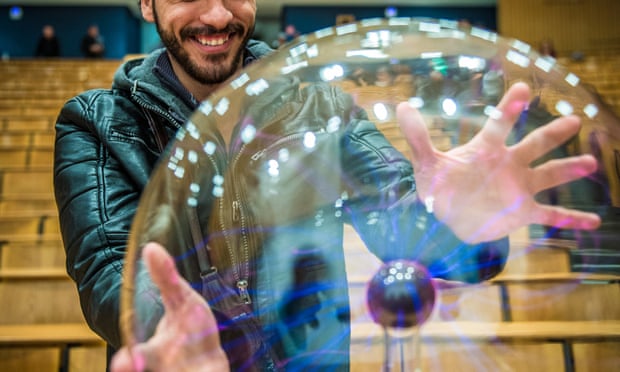
It’s kind of funny about nature, no matter where you go, there you are: in nature.
In Bonn, on opposite sides of the Rhine, the laws of nature remain the same, also further afield, throughout Europe, across the Atlantic or in Antartica, where physicists have set up a neutrino telescope. Newton realized that an apple falling on Earth obeys the same gravitational law as the Moon circling the Earth. We have even followed satellites out to the furthest edge of our solarsystem, and it’s still the same: gravity, as we know it. Atomic physics as measured in the spectra of the elements, obeys the same laws in our laboratories as it does in distant galaxies. There is no relativism about the electron mass.
The fundamental laws of nature are described in physics, which thus presents a universal language which speaks to all, irrespective of your religion or non-religion, your country of origin, or even what planet you are from! Here in Germany, planet sauerkraut and wurst, we currently have people arriving from all over the world, in particular from Syria. They are fleeing from violence and terrible atrocities. After some reluctance we as a country fortunately decided to open our arms and welcome them. The scenes at Munich train station in September this year were particularly memorable. Unfortunately, however, so also are the scenes from Köln (Cologne) train station on New year’s Eve, just 30km north of Bonn. We have a huge challenge, but also a tremendous opportunity, to integrate these people into society.
Since nature is universal, and physics is the language, maybe we can reach out to the refugees through physics. Does this work in practice? And if so, how?
In Bonn we have been putting on physics shows for 14 years, for children aged 10-99. The showsare devised and presented together with the local university physics students. We present entertaining live physics experiments, usually embedded in a story. We always explain the science involved, in the hope that people walk away with an appreciation of physics, and physicists(!), and maybe some curiosity about how things work. We have travelled throughout Germany, and have been to Switzerland, Italy and Great Britain. In March, 2016, we will be going to Beijing, China, for the first time. Talk about language barriers!
Throughout we have found that the experiments always spoke to everybody. How about to Syrian refugees? Alex Karim – an old hand at the physics show and now a staff scientist in the Bonn astronomy department – and I decided to gather a team of students to put on a show. From the start we specifically included Iraqi and Persian students in the department. We decided to embed the experiments in the Aladdin story, certainly familiar to all. But how should we bridge the language gap in order to convey some of the underlying physics? Subtitles wouldn’t work in a live performance. We decided to have a narrator, Ahmed Abdullah, an astronomy Ph.D. student,sitting in a corner with an old book, summarizing the story at various stages in Arabic. In addition, the Genie was played by Mazuza Ghneimat, studying for her Ph.D. in experimental high-energy physics. Like Ahmed, she was new to the physics show and hesitant to appear on stage. As the Genie she thus explained all the experiments in Arabic from off-stage by microphone with an image of a Genie projected above a smoking Aladdin’s lamp. This turned out to work very well, as it gave the Genie a mythical touch.
The main challenge was to get the refugees to the lecture hall. Unfortunately the city was not very helpful. They did not give us a list of addresses or telephone numbers of refugee hostels and then didn’t pass on the posters and flyers we had printed. In the end in the last three days, we walked into the places we knew and talked to whomever we could. We then had physics show people and friends pick up the refugees on Sunday and accompany them to the lecture hall. We were delighted to welcome 120 people into the lecture hall.
During the show the atmosphere was at first quite reserved, but slowly the audience warmed and I believe it is fair to say that in the end they were very enthusiastic, whooping and clapping in the final applause. Many came on to the stage to have a closer look at the experiments and to take selfies with the students in their costumes. In the foyer we had set up many hands-on experiments for after the show. This gave ample opportunity for more personal discussions. There were even quite a few refugees who had a background in science, technology, engineering or mathematics, and were looking to continue their education. We should have had university admissions advisors there!
We will do our best to repeat the show in February.
Herbi Dreiner is a physicist at Bonn University.
guardian.co.uk © Guardian News & Media Limited 2010
Published via the Guardian News Feed plugin for WordPress.
Can physics help communication between refugees in Germany and their hosts?











0 comments:
Post a Comment